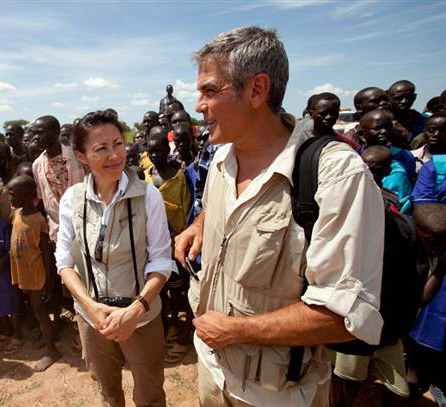
Editor’s Note: NBC news anchor Ann Curry sat down with Enough Project Co-founder John Prendergast to discuss what compells her to report on and advocate for human rights in war zones around the world.
JOHN: What is your motivation for being such a forceful advocate for the rights of people from Sudan, Congo, and other forgotten war zones around the world?
ANN: When I look at people and I decide who is going to be my friend, I don’t look at their bank accounts, how famous they are, how beautiful they are, or what they can do for me. I look at: Who are they really in the worst of circumstances? What kind of a human being might they be? Would they stand up against evil? Would they stand up to do the right thing? Are they the people who watch someone drown because they are too afraid to call 911? Or are they the people who throw in the life raft? Or the people who jump in to save the person in the water who is drowning? This question I think is a fundamental core question, and it deals with who we are and what makes us who we are.
It can be how we were raised. It can be ideas we let percolate in our brains. For me, it was early on as a young person discovering injustices and discovering that there were people who enlist themselves to make things right. So when as a child I discovered, for example, there was a Holocaust, that was enough to interest me. But then I realized there were people who risked their lives to save people from the Holocaust, and that was mind- blowing. And then what really made my eyes open up was when I realized that people not only risked their lives but they also risked their children’s lives, and in some cases their children were killed trying to save Jews. And I thought to myself, “How much love is there when you risk the thing you love the most, your child? What must be within you to do that?”
So that launched an investigation about this question that I have really been conducting my entire life. This idea of who we are and what we’re made of, I think, is a key question because it is what will define who we will be. What we pivot into as we evolve, as we continue to evolve into a species that is moving toward greater compassion, greater understanding of each other. That argument I may need to make because most people may not agree with that argument. But if you look back through the scope of history at everything you’ve learned about history— even if you have to factor in the injustices of, say, the wars in Sudan, Congo, the genocide in Rwanda, and about what’s happened to civilians in Iraq and Afghanistan— you have to acknowledge that the very fact that we are outraged, that we move against these injustices speaks to the rise of empathy. And we can see that even though we once did so, we are not today allowing children at the age of five to run around homeless on the streets of Manhattan. And we no longer consider the killing of civilians to be just a factor of war but rather the crime against humanity that it is. And we can elect a black president given the racist history of this nation. All of these things speak to the rise of empathy.
So that argument now made, I believe that when you have this kind of thinking in your mind, it’s not even a question as to whether you should stand against anything that smells like inhumanity. Anything that looks like a crime against our human family. Nothing makes me angrier than when one human being purposefully just puts down, hurts, diminishes, kills, or tries to frighten another human being for no other reason except that one has power and the other does not. One is of one race, the other is of another. One is a man and one is a woman. One is an adult and one is a child. Injustice is something we should never tolerate, and I think we are moving toward being a species that will no longer tolerate it. You never know if you can be that person who, in the midst of the Holocaust, would step forward and have your child walk Jews to a place where they can be safe.
You never know who you will be when you are faced with this question. But you can practice, and you can attempt to learn to grow this part in you. And I believe that if you do, you are more likely to step up.
This is an abbreviated excerpt of Ann Curry’s Enough Moment. The full version is published in The Enough Moment, a book by John Prendergast and Don Cheadle about engaged citizens – known and unknown, in the U.S. and abroad – who are mobilizing to help end genocide, rape, and the use of child soldiers in Africa. Visit the Enough Moment Wall to hear people describe their “Enough moment” and to upload a video, photo, or written testimonial of your own.
Photo: NBC anchor Ann Curry and actor George Clooney during a trip to South Sudan in 2010 (Tim Freccia/Enough Project).

